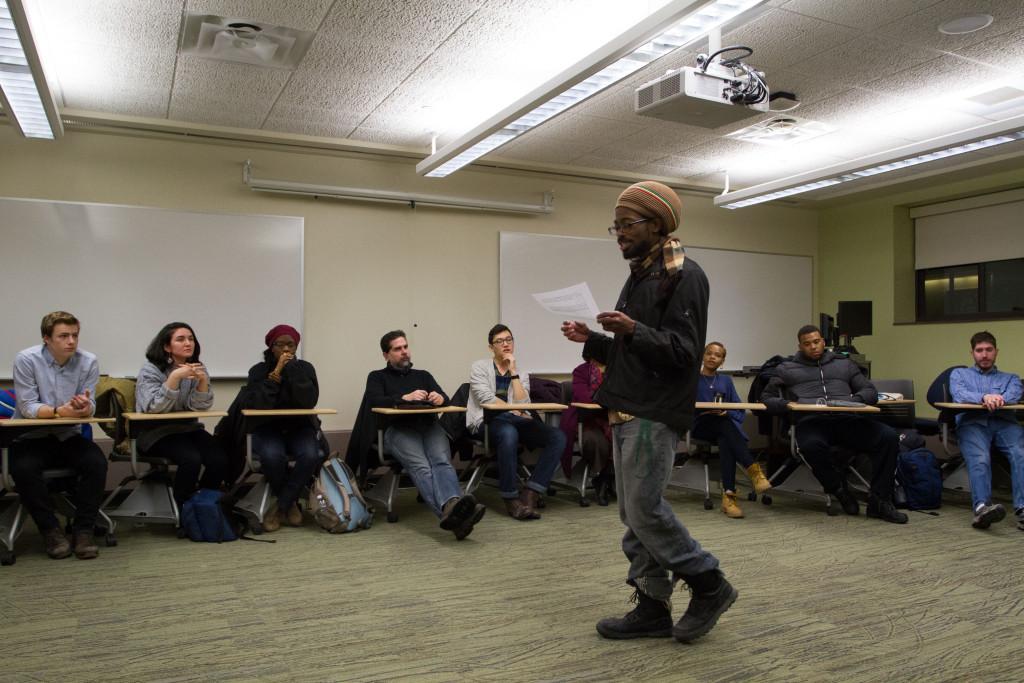On Feb. 5, the Collective hosted the final event of the Assata Shakur Series, discussing the nature of structural knowledge and how it leads to oppression.
The Collective is an informal group of students “invested in critical thought and action against all systemic forms of violence.” The group was formed by many of the organizers of the protest against the college’s lack of a structured Native American studies minor.
The event was titled “the People’s Epistemology.” Epistemology is defined as the theory of knowledge, particularly in regard to its methods, validity and scope. The event was formatted as a discussion, with senior Dubian Ade, one of the organizers of the event, opening with a statement from the Collective on the purpose of the meeting, which was to discuss the concept of epistemology in the context of campus events.
Ade talked about how the distribution of knowledge to students is a source of money for institutions of higher education. He said institutions have defined what knowledge is and what it means to get an education.
“If you think about what this institution is trying to do, it’s trying to generate capital by capitalizing on the commodification of this thing called knowledge,” he said. “It’s doing this, and it’s also articulating what knowledge is.”
Ade said to escape oppression, it is necessary to decentralize the collection of knowledge and form a different understanding of where knowledge is derived from.
The discussion also turned to the protests that occurred last semester to stand against instances of police brutality and systemic inequality, such as a grand jury’s decision not to indict a police officer in the death of Eric Garner. The protests also stemmed from the desire among a group of students for the college to have a structured Native American studies minor with a tenure-track professor. The protests included a group of students marching to the Peggy Ryan Williams building to confront President Tom Rochon about these issues.
Ade said when students marched to the Peggy Ryan Williams Center, they were creating their own type of epistemology by challenging the lack of knowledge available at the college on the topic of Native American studies.
“This whole idea about this thing called the people’s epistemology is that the oppressed, decolonized, can produce their own form of knowledge and rearticulate what knowledge is and what it means,” he said. “And actually, we’ve already been doing this … when we went to PRW we were producing knowledge.”
The discussion about the campus protests led to a conversation about the general apathy found not only at the college — where only a fraction of students participated in the movement — but in U.S. society in general. Asma Barlas, program director of the Center for the Study of Culture, Race and Ethnicity, said people in the U.S. have conformity drilled into them through the education system.
“Everyone’s so domesticated, and I go crazy in my classes after 23 years,” Barlas said. “It’s like, ‘What’s wrong with you?’”
The discussion also focused on the legacy of colonialism in the U.S., which Senior Crystal Kayiza, president of the Student Government Association, said many people are not aware of.
“One of the most destructive parts of colonialism was the fact that it completely removed the motivation to want to know,” she said.
Kayiza said there are students who are ingrained in the knowledge the system chooses to provide. An example she used was some students lack of understanding how the Eric Garner verdict connected to the college’s lack of a structured Native American Studies minor. Kayiza said there is a connection between the forcible removal and killing of Native Americans during European colonization and current violence against black people. She said both are results of the colonization of North America by white Europeans and the structural racism that resulted.
She said this lack of motivation to see the connection between different forms of oppression is part of that legacy of colonialism and something that the country is still dealing with today.
The event was the last in the Collective’s Assata Shakur Series. Senior Kayla Young said the Collective came about not only because of the lack of an indictment in the Garner case or that the college didn’t have a structured Native American studies minor, but also through the participants’ engagement in different political contexts and willingness to challenge each other to grow intellectually and politically.








